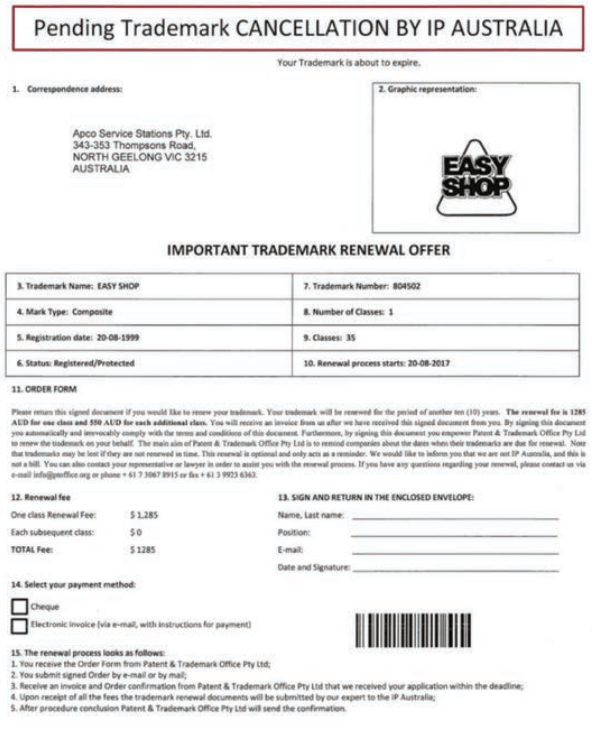Owners of patents, trade marks and registered designs are increasingly being targeted by unscrupulous organisations with fake invoices and unethical business practices. It is important that you and your accounting teams are alert to this.
Check that invoice!
Being an IP owner means that you will be required to pay annuities. These are payable every year for patents and every 10 years for trade marks. Increasingly, we are seeing pseudo (unsolicited) invoices being sent directly to rights holders, and it is important that these are not paid. If annuities are handled by your attorney, you should alert them directly to the receipt of these invoices. If you inadvertently pay these invoices, it may result in duplicate payments by your authorised agent (your attorney). The worst case scenario is that if you pay one of these invoices, you may find that subsequent annuity payments are not processed and your rights may cease.
Organisations that have been known to be active in this area include:
- Commercial Centre for Industry and Trade (Switzerland).
- Company for Economic Publications Ltd (Austria).
- Company for Publications and Information Anstalt (Liechtenstein).
- Edition The Marks KFT (Hungary).
- European Institute for Economy and Commerce (Belgium).
- FOIP Federated Institute for Patent and Trademark Registry (USA).
- Globus Edition SL (Spain).
- INFOCOM (Switzerland).
- Institute of Commerce, Trade and Commerce (Switzerland).
- International Patent and Trademark Agency (Czech Republic).
- International Patent and Trademark Register (Germany).
- IP Data s.r.o (Czech Republic).
- IPT Patents.
- IT & TAG (Switzerland).
- Objective Concept (France).
- Patent & Trademark Office Pty Ltd (Melbourne, Vic, Australia).
- Patent & Trademark Organisation LLC (based in the USA with a street address in Melbourne).
- Register of International Patents and Trademarks TM Collection (Hungary).
- TM-Edition Ltd. (Hungary).
- TM Worldwide (Hungary).
- Trade Mark Publishers (based in Austria with a street address in Sydney).
- Trademark & Patent Publications (based in Poland with a street address in Sydney).
- UPTS – Universal Patents and Trademarks Service s.r.o (Czech Republic).
- World Patents Trademarks WIPT s.r.o (Czech Republic).
- ZDR-Datenregister GmbH (Germany).
- WORTA – World Organisation for Trademarks.
Below is an example of an invoice from Patent & Trademark Office Pty Ltd.

Monitoring services
Another area where organisations are active is in supposed ‘monitoring services’, which include requests that offer to ‘monitor’ your IP right. For example, they may offer to monitor whether your trade mark is being used as a domain name or whether identical trade mark applications are made in particular countries. These services may indeed be commercial and legitimate offerings however, many are not. You may also receive requests to monitor and alert you when renewals on particular patents or trade marks are due. Again, some services may be legitimate but many are not. If your IP is being managed by an attorney firm, they will have a sophisticated annuity reminder system that is tied in with your entire IP portfolio.
Additional registers
We have also seen an increase in offers to list your IP on a ‘register’. These supposed ‘registers’ are usually based outside of Australia and make elaborate claims about the ‘need’ to be listed on these ‘registers’ to effectively protect your IP. These additional ‘registers’ are simply money making exercises and provide no additional legal protection. Once you have registered your IP in another country, it will exist on that country’s publicly accessible official register. This is automatic and a standard part of the patent or trade mark application process.
Domain names
If you are the owner of a registered trade mark, you may receive unsolicited letters alerting you to domain names which contain your registered trade mark. The letters often request that you engage them to undertake investigations or to acquire the alleged domain names. While domain names may be an important part of your trade mark strategy, it is important not to react to these alleged threats. If such domain name registrations exist and affect your rights, there may be other avenues available to stop or secure the domain name.
Protect yourself from scams
As official registers of IP rights are publicly available around the world, unscrupulous organisations can mine the information and create mass mail outs offering bogus or worthless services. The only way you can protect yourself is to be vigilant and ensure that those who handle IP correspondence in your organisation, particularly accounting teams, are aware of these scams. If you receive any of these correspondences, please contact your attorney who will be able to advise you further.